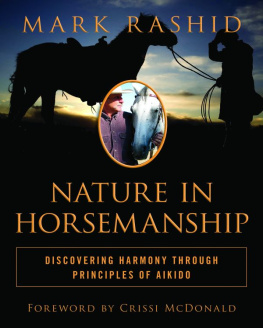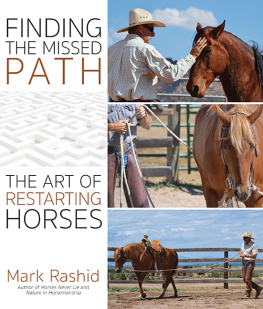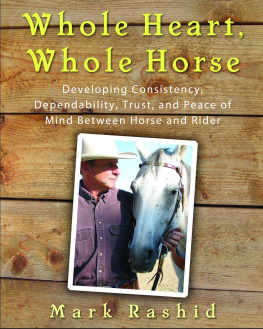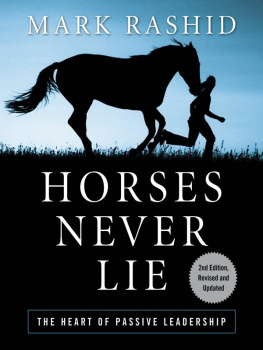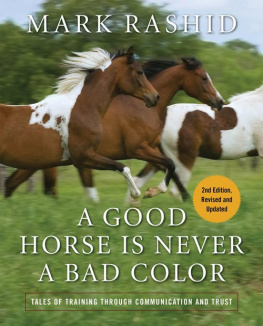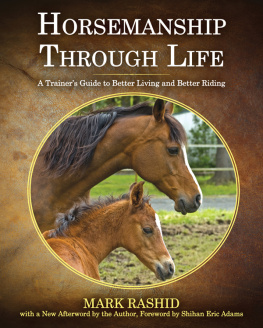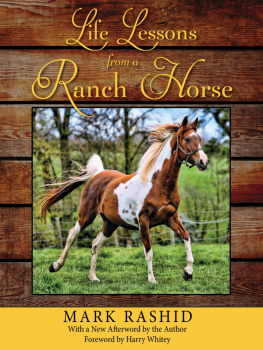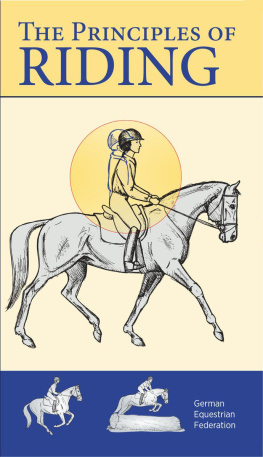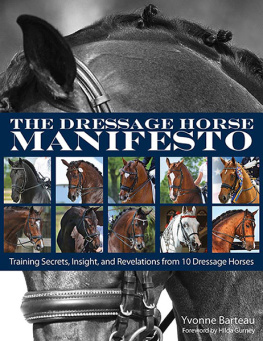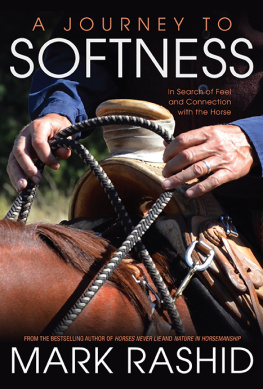
Nature
in
Horsemanship
Nature
in
Horsemanship
Discovering Harmony through
Principles of Aikido
Mark Rashid
Foreword by Crissi McDonald
Illustrations by Mike Theuer

Skyhorse Publishing
Copyright 2011 by Mark Rashid
2011 Illustrations by Mike Theuer
All Rights Reserved. No part of this book may be reproduced in any manner without the express written consent of the publisher, except in the case of brief excerpts in critical reviews or articles. All inquiries should be addressed to Skyhorse Publishing, 307 West 36th Street, 11th Floor, New York, NY 10018.
Skyhorse Publishing books may be purchased in bulk at special discounts for salespromotion, corporate gifts, fund-raising, or educational purposes. Special editions can also be created to specifications. For details, contact the Special Sales Department, Skyhorse Publishing, 307 West 36th Street, 11th Floor, New York, NY 10018 or info@skyhorsepublishing.com.
Skyhorse and Skyhorse Publishing are registered trademarks of Skyhorse Publishing, Inc., a Delaware corporation.
www.skyhorsepublishing.com
10 9 8 7 6 5 4 3 2 1
Rashid, Mark.
Nature in horsemanship : discovering harmony through principles of aikido / Mark Rashid ; foreword by Crissi McDonald.
p. cm.
ISBN 978-1-61608-350-2 (alk. paper)
1. Horses--Training. 2. Horses--Psychology. 3. Horses--Behavior. 4. Human-animal relationships. I. Title.
SF287.R29 2011
636.10835--dc23
2011014222
Printed in China
Contents
Foreword
In addition to traveling to help people and horses around the country, Mark and I spend a fair amount of time studying to keep growing in our own knowledge and understanding. Our studies are not limited to horses, but certainly everything we have been learning can be applied to our work with them. The book you now hold in your hands is the result of Marks many years of study in aikido, as well as current theories on animal behavior, brain anatomy and function, and many other topics.
For example, one of the things we have learned is that there is a theory about human brain function that states we actually have three brains, not just one. This theory states that nature doesnt throw away something that already works, so each part of our brain evolved around the previous part. Our first brain, what many know as our reptilian brain, controls many of the bodily functions needed for survival: heart beat, breathing, etc. Our middle brain is very similar to the way many mammals brains function, and in humans makes up the area where one of the processes is emotion. The last and uppermost part of our brain to develop, the neocortex (sometimes also referred to as the cerebral cortex), has evolved to be one of the biggest and most complex among mammals. Not only do we have three separate structures that are complexly connected, each brain has its own sense of time and space, its own way of seeing and remembering things, and its own way of processing incoming information.
What, you may be thinking, does this have to do with horses?
Although we spend most of our days using our higher brain functions for the tasks we perform, we also share many similarities with animals. We desire comfort, both in body and spirit. We make friendships and lasting bonds to not only those of our own species but outside our species as well. We like learning new things, enjoy having fun, and will seek out new experiences for their novelty. Through reading about the latest research on brain function, what I have come to understand is that as humans, we spend a great deal of our time in our third brain, the neocortex. One of the things this area of the brain does is take in millions of bits of information each day, process it all, and then put it all together in one big picture. There have been many studies done on how we think (you will read about inattentional blindness later on in this book) and what we see. We know that most people, most of the time, gather specific bits of information and process it into one big picture.
When we start looking at animals, however, they are almost opposite. Their brains are set up differently, and especially so in horses (or any prey animal). Horses, it turns out, are creatures of specificity. They see everything . Most horse owners can tell you about a time their horse spooked suddenly (to the person) and for no apparent reason. Or how the first three times their horse got in the trailer without any problems, but the fourth time the horse refused. The way we see things, and the way our brains process what we see, makes it almost impossible for us to spot changes in detail that horses cant help but see. I think the value in knowing this piece of information will greatly increase not only our understanding of horses but also our tolerance when they are alerted to something or, for some reason, act out of fear. It is about being able to step out of our own perspective and take what horses do far less personally. As I have often heard Mark say, horses arent doing anything to us, they are just being horses.
It is our almost blind grip on thinking about everything that sometimes causes us to lose track of the horse itself. Going back to how our brains are set up, it is easy to see how automatic it is for us to gather information, sort it out, see the big picture, and make a decision based upon that. We all do it, every day, and dont really care how it happens, only that it does. To be realistic, this function is part of our species, and necessary not just for our survival but our growth as well. I think this is also why knowing a variety of techniques is important for a lot of horse people; we are using a part of our brains that we are really good at using, so there is a certain comfort in it. It is not as though technique is a bad thing, but what I am suggesting here is that it can be balanced with that part of ourselves that takes in information on a different level, the level horses live in. The part that we forget is that we dont necessarily have to think so much, so much of the time. I believe that one of the many reasons why we love being around horsesno matter what we have them foris that they offer us an opportunity to experience something that is less about thinking and more about reconnecting with a wisdom that we dont often tap into. I have heard many people say they feel more grounded, more calm when they are around their horses. Masters of connecting, horses will give whatever they can of themselves, doing things that they normally wouldnt choose to do, because we ask. Perhaps remembering this when we are around these beautiful animals will help create a place where we can understand one another a little better, and fight a little less.
Within these pages Mark shares with us not only these ideas mentioned above, but also how we can potentially find a more harmonious way of working and being with our horses. He offers some unique and thought-provoking ideas on the nature of harmony, the rules of nature and the rules of man, and how nature has equipped all of us with not only the tools to survive but also many ways to grow. And how ultimately it is about honoring not only our place on this planet but every other creature as well.
All the best to you and your horses.
Crissi McDonald
Estes Park, CO
December 2010
Nature
in
Horsemanship
Chapter 1
Aikido and Horsemanship
Dont challenge me, my aikido instructor said as he pushed me across the mat. Both the statement and the push took me by surprise. We were in the middle of a two-day aikido seminar, and my instructor had just finished demonstrating to the class a training technique in which he threw and then pinned me face-first on the mat. After releasing me, he effortlessly slid to one side and stood up. I stood up too.
Next page
